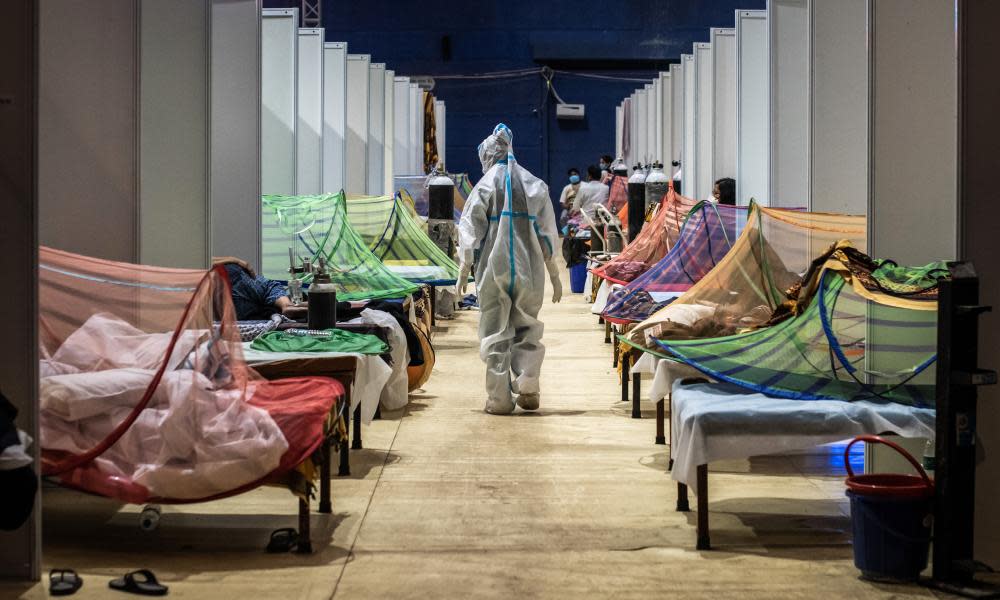Australians could die from Covid in India under travel ban, medical chief warns

Australia’s chief medical officer, Prof Paul Kelly, has warned the government that citizens stranded in India face the prospect of serious illness without healthcare and a “worst-case scenario” of death from Covid under a controversial ban on travel to Australia.
But given Australia’s “limited” quarantine facilities, Kelly recommended the government go ahead with its decision to suspend arrivals from India until 15 May, noting it would be the first time that such a determination had been used to prevent Australian citizens and permanent residents entering Australia.
The release of the advice comes as the Morrison government defended the controversial travel ban that criminalises returning to Australia from India. The Coalition said it was a necessary health measure and the prime minister, Scott Morrison, said the government would review the suspension as soon as this week.
Related: Marise Payne denies racism motivated ban on Australian citizens returning from Covid-ravaged India
Kelly’s letter to the federal health minister, Greg Hunt, noted the penalties for breaching the relevant section of the Biosecurity Act included five years’ jail or a fine of $66,600 or both. The medical officer made no specific recommendation on fines and jail time
Kelly advised there remained a “significant risk” of leakage from Australia’s hotel quarantine system, particularly from arrivals from India. He said there had been high rates of Covid detected in arrivals from India, a high proportion of Australian cases traced back to India and a high proportion of virus “variants of concern” among those cases.
“Each new case identified in quarantine increases the risk of leakage into the Australian community through transmission to quarantine workers or other quarantined returnees and subsequently into the Australian community more broadly,” Kelly’s letter to the government, tabled in parliament on Monday, states.
“Australia’s quarantine and health resources needed to prevent and control Covid-19 introduced into Australia from international arrivals are limited.
“Due to the high proportion of positive cases arising from arrivals from India, I consider a pause until 15 May 2021 on arrivals from India to be an effective and proportionate measure to maintain the integrity of Australia’s quarantine system. This measure will likely allow the system to recover capacity, which is a critical intervention in preventing and managing the spread of Covid-19 in Australia.”
Kelly said that given the determination was for only a limited time, he believed it met the criteria of being an emergency requirement that was “in place for only as long as necessary”.
But he warned that India remained a “high risk” country and that with more than 18.3 million positive cases, and over 204,000 deaths, Australians stranded there were at risk.
Related: Australia’s ban on travellers returning from India due to Covid crisis may be unlawful
“I wish to note the potential consequences for Australian citizens and permanent residents as a result of this pause on flights and entry into Australia,” Kelly said.
“These include the risk of serious illness without access to healthcare, the potential for Australians to be stranded in a transit country, and in a worst-case scenario, deaths. I consider that these serious implications can be mitigated through having the restriction only temporarily in place, ie a pause, and by ensuring there are categories of exemptions.”
The exemptions include airline crew, diplomats, defence personnel and members of Australian medical assistance teams.
The government has insisted the travel ban on Australian citizens and residents who have been in India in the past 14 days is legal and necessary. It has flagged it could help 650 vulnerable Australians in India as soon as possible.
“This only needs to be there in place for as long as it needs to be there to keep Australians safe,” Morrison said on Monday.
Hunt said the government had previously implemented similar measures under the Biosecurity Act including in relation to flights from Wuhan in China when the pandemic first broke out, in March 2020, and from Papua New Guinea.
“Where we have seen a major risk that would threaten a wave [of the pandemic] in Australia, we have taken action,” Hunt said.
He said it had been an “agonising” decision to put in place the determination, but the rate of infection was about seven times the level the hotel quarantine system could safely manage.
Related: While India is desperate for oxygen, its politicians deny there’s even a problem | Mukul Kesavan
He said the number of cases in Australia from returned travellers from India had gone from 14 in February to 38 in March, then jumped to 210 in April – a 1,500% increase.
“That led to an agonising decision, just as we did with China, just as we did with Papua New Guinea.”
Last week, the foreign minister, Marise Payne, said the government was exploring ways to help the 650 Australians in India who had registered as vulnerable.
“They are also all over India, literally in every single corner of the country. There is not a significant concentration in one place or another other than New Delhi, and that does make the process challenging. But we will stay in touch with them as I said, redouble our efforts to do that and provide any support we are able to.”

 Yahoo News
Yahoo News 
